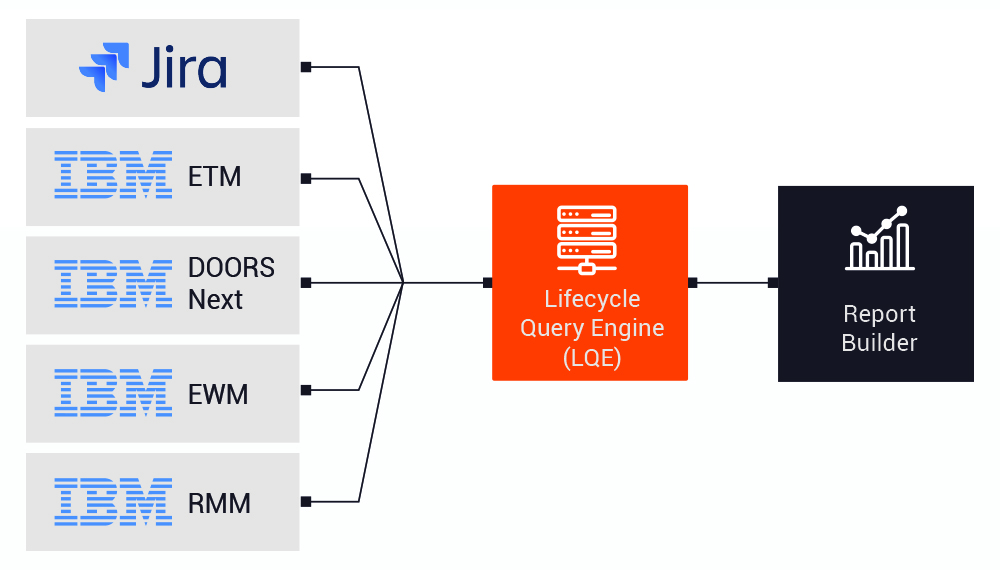For decades, product development teams have relied on robust application suites purpose-built to bring their specific products to market with speed, quality and efficiency. Software developers gravitated towards Application Lifecycle Management (ALM) toolsets while hardware-focused teams adopted Product Lifecycle Management (PLM) platforms.
But over the last ten years or so, the number of software lines of code required to operate highly complex products in industries like aerospace, automotive, industrial and healthcare have expanded exponentially. In 2010, the average car required approximately 10 million lines of software code. By 2016, the number had grown to 150 million.
Legacy ALM and PLM platforms and the supporting systems around them have been pushed beyond their limits as they’ve tried to accommodate this new category of incredibly connected, complex and integrated products that offer little to no margin for product failure.
“Today our 20,000 developers are 90 percent hardware-oriented,” said Herbert Diess, CEO of Volkswagen AG in 2019. “That will change radically by 2030. Software will account for half of our development costs.”
In response, developers and engineers have been quick to adopt a host of new tools to help them meet rising innovation speed, quality and cost targets. Project management and issue tracking tools like Atlassian’s Jira have quickly become essential elements of the development ecosystem, along with open source initiatives like Git for code management.
New solutions are needed that take a more holistic approach to supporting the development needs of the entire hardware-driven, software-enabled product, including the growing need for collaboration, visibility and traceability across the enterprise – the promise of digital thread.
Introducing Persistent UNITE integration foundation
The Persistent UNITE integration foundation is a family of lightweight integration plugins created for industrial organizations looking to accelerate their digital journeys. UNITE elegantly brings together IBM Enterprise Lifecycle Management (ELM), one of the leading ALM solutions on the market, with a growing portfolio of enterprise development tools, including:
- UNITE for Jira®
- UNITE for Git, including GitLab, GitHub and BitBucket
- UNITE for ENOVIA® PLM
UNITE leverages Open Services for Lifecycle Collaboration (OSLC) to create relationships between artifacts, enabling integrations with IBM ELM tools without data synchronization.
By establishing standards across tools and teams, UNITE removes overhead and waste caused by duplicate data entry, establishing a Digital Thread across functions, processes, locations, teams and projects that delivers a “single version of the truth,” anywhere in the organization.
Global traceability, reporting, configurations and more
For example, UNITE for Jira enables complete traceability across Jira and IBM ELM tools, allowing users to create new linked Jira items and preview and navigate to Jira items quickly with rich hover features right from the ELM tool of choice.
UNITE for Jira also makes robust report creation a reality using ELM’s Lifecycle Query Engine (LQE), enabling traceability reports that augments data from ELM tools by combining it with Jira data.
For organizations that leverage global configurations, UNITE for Jira users can link to ELM artifacts with configuration management enabled, honoring the global configuration context while also offering support for link navigation from third party tools.
UNITE for Git delivers the same tight integration and traceability between Git’s source code repositories (GitHub, Bitbucket and GitLab) and ELM’s toolset, improving product reliability, optimizing processes and improving governance around product design processes.
Benefits of Persistent UNITE Integration foundation
Industrial organizations that rely on UNITE’s integration plugins to deliver tighter levels of integration than ever before are experiencing:
- Improved Collaboration: Business analysts, development teams and testing teams all have the same information at the same time, anywhere in the world.
- Improved Productivity: Each of these teams can use their system of choice to manage their work, knowing they’re working with the most current, correct and complete information possible.
- Improved Project Traceability: UNITE weaves a digital thread between versions of requirements, designs, tests and files/commits, ensuring total traceability across tools, platforms and systems.
- Improved Data Governance & Processes: By fully integrating the foundational elements of your development ecosystem, you’ll achieve “one version of the truth,” eliminating unnecessary bottlenecks in your processes and allowing for true end-to-end process visibility for more effective management.
Backed by unprecedented IBM ELM and industrial integration knowledge
Persistent UNITE’s growing foundation of integration offerings has been developed by Persistent Systems, a premier industrial integrator responsible for accelerating the digital transformations of more than 100 industrial organizations worldwide.
Persistent is also the IBM partner responsible for developing and supporting the ELM toolset, including Version 7.0 that launched in Spring 2020. Persistent’s global team of developers uses ELM each day to manage the development of ELM tools, the UNITE integration foundation plugins, and other custom software solutions that deliver a unique and lasting competitive advantage for Persistent’s partners and customers.
That combination of broad industrial expertise and deep software development experience – particularly with IBM ELM – ensures that UNITE’s integration foundation is thoughtfully designed, well-executed and tightly integrated as possible.
To find out how to make digital thread a reality with UNITE’s integration plugins, click here now.
ABOUT THE AUTHOR
Bertrand Raillard
Offering Manager, Persistent Integration Platform
Persistent Systems, Ltd.
Bertrand Raillard is responsible for leading the Integration products and services offerings at Persistent Systems, enabling customers to create truly end-to-end digital solutions using their preferred engineering platform.
To accomplish this, Bertrand relies on 25 years of experience in the software industry, with the last two decades focused on supporting a variety of industries and manufacturers of everything from blast furnaces and grain silos to jet fighters and chewing gum.
Bertrand holds a bachelor’s degree from ISTEC, the Institute of Higher Education in Marketing and Commerce in Paris, France.








